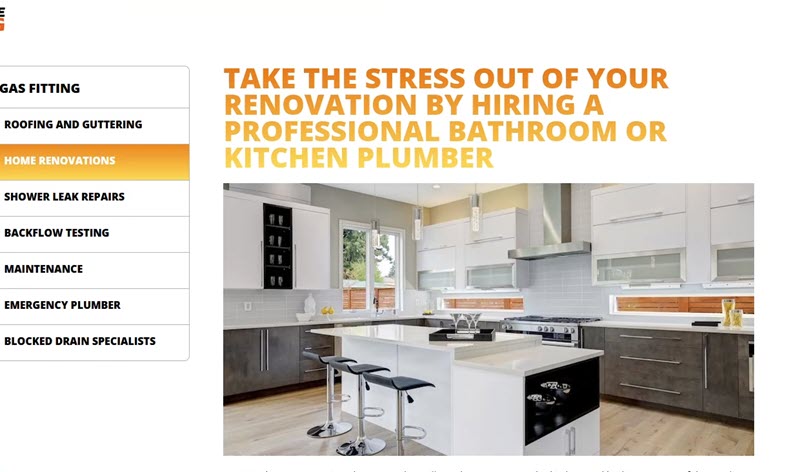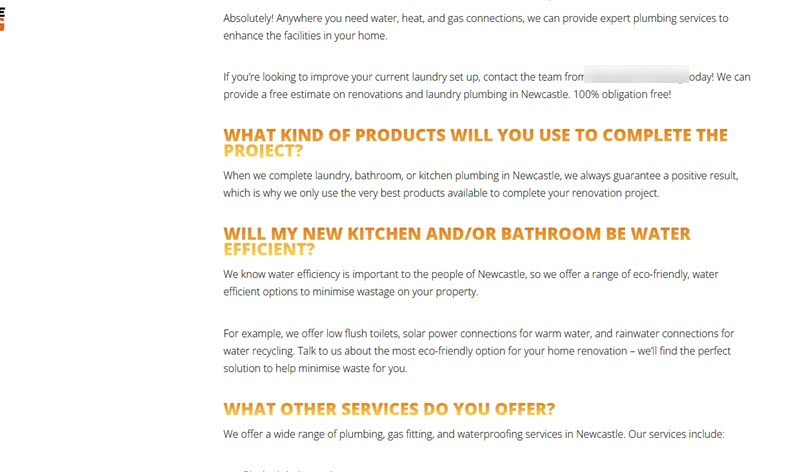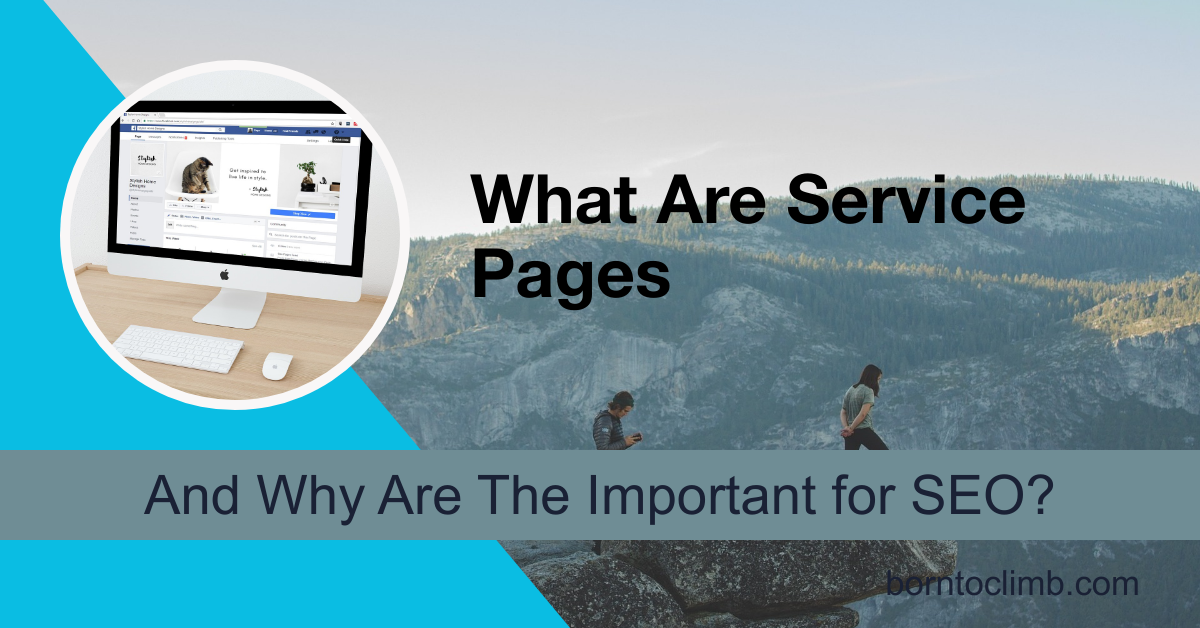You might spend most of your working hours dealing with pipes and plumbing fixtures, but you know the world has gone digital. To some extent, you rely on a website to generate the contacts and projects that produce your income. That’s true if you work for yourself or as part of a plumbing business.
And a big part of that is that your business website needs to have service pages to cater to local SEO. But how you have them set up is just as crucial to your website success as it is to have them in the first place.
More...
What Are Service Pages?
Simply put, service pages are web pages for the individual services you provide as a plumber or a plumbing business. Standard plumbing services that you might provide could include:
- Drainage services
- Fixture repairs and upgrades
- Fixing leaky pipes
- Bathroom plumbing services
- Kitchen renovations
- Blocked drains
- Emergency plumbing repairs
- Water heater service
I’m sure you get the idea. There is a Our Services Page that summarises and links to each individual service page.

What Should Service Pages Accomplish?
Service pages need to accomplish several things:
- Let Google and other search engines know the services you offer.
- Capture online traffic looking for those specific services.
- Convert them into actionable business leads you can use.
Why Should You Create Pages For Each Of Your Services?
Having different pages for every service your business offers helps you get more business. The impact happens at three different levels:
- Search engines
- Your website
- Human beings
Why Do Search Engines Care About Specific Service Pages?
When a potential customer looks up your business, they're looking for something. When they use a search engine, they're also looking for something.
If they count on you to fix their plumbing problem, they don't just expect you to take care of it. The prospective customer also wants the best value solution.
Likewise, when they ask a search engine for something, they don't want just a possible answer. They want the best answers.
When prospective customers look for a plumber in their area using a search engine, they do so with the expectation that their search engine will give them plumbers who are the best match for their search.
Consider an example of a homeowner who wants a new toilet put in. Their search query won't just be 'plumber near me' but 'plumber new toilet near me' or ‘bathroom plumber near me’.
One thing that search engines are sticklers for is relevance. If you have a services page that lists everything together, it might be only 10 per cent of your page talking about installing new toilet fixtures. That was only one of the standard plumbing services listed earlier, after all.

An example of a typical plumbing services page listing all the services on one page
However, what if a competitor has a page that's only about new toilet installation and nothing else? Likely Google’s machine will consider that page more relevant match and display that to the user more prominently than yours.

This page is more about a specific plumbing service. It could be made better by making it about kitchens or bathrooms only

Page content that answers user is good
How Does It Help Your Website To Have Specific Service Pages?
Specific service pages make it possible for us to do A/B testing. We can create two pages for the same service and then put them both on your website.
Then, we can route equal volumes of online traffic to each over time and see which one does better. That lets us help you find more conversions through your website.
If you lump all our services together on a single page, it's impossible to know what marketing messages are working and what isn't.
How Do Consumers React Better to Individual Service Pages?
People looking for a specific plumbing service typically find individual service pages to be a better user experience.
Less Scrolling
When the webpage is only about the specific service that they need, they don't have to scroll by a bunch of content about other services that they're not looking for at the time.
While they might need a new kitchen tap at some point in the future, they don't need to be sold on that right now when the pipe under the sink is flooding their home. If they're looking your website up on a smartphone, excessive loading times or manual scrolling might make them back out and visit another link.
Speaks To Them
While your service pages will invariably have many commonalities, you can still cater each one to the appropriate voice of its likely reader. A service page for emergency plumbing work will cover response time, trustworthiness, and availability. In contrast, a service page about clearing out drainage will speak more to convenient appointments and restoring the power of their home to drain water out of showers and tubs.
Should You Always Avoid Listing All Services Together?
We firmly believe that only two pages on your overall website should have a list of all your services at once:
- The Home Page: This page should summarise your primary services and read like a menu of everything you provide your clients and customers. However, these items should also directly lead to individual service pages.
- Your Sitemap: This page won't be heavy on content or descriptions, but it might still read like a list of all your services when covering your various pages. A robust sitemap can help human visitors find what they're looking for. It also helps them stay on your site longer, which helps your SEO. Search engine bots responsible for indexing websites also find sitemaps useful because the links let them read your entire website and rank it better.
Why Are They Important to Local SEO?
Service pages let you cater directly to the concept of local SEO. In its basic form, local SEO is just online users typing in 'plumber near me' or 'plumber Melbourne' instead of just 'plumber'. They do it so they don't get plumber listings for places too far away to help them.
Save Your Marketing Money
Focusing on local SEO helps you ensure your marketing resources don't go to waste. If you only do plumbing work in Alice Springs, then all of your target keywords or phrases should have 'Alice Springs' in them. That way, your pages only load for people actually in the area.
Also, if you are in a larger city like Melbourne, you can use local SEO to narrow down your service area by the suburban locations. If you don't offer plumbing services in the middle of the city but are available in Williamstown, you would cater pages to 'plumber Williamstown' but not 'plumber Melbourne city centre'.
What Elements Should a Local Landing Page Have?
We recommend that local landing pages have at least these particular segments:
- Brand: This has to be more than just a logo. Reinforce your brand to stand out from all the other plumbers people are looking at.
- Contact Information: Many plumbers put this down in the webpage footer. We like to see it closer to the top and in a consistent position for each page. Phone numbers, in particular, deserve prominent display. While most people use websites to find plumbers, many still rely on phone calls for the actual contact.
- Embed Your Map: Embedded maps help consumers understand where you are located. This helps convince them you're close to them.
- Local Images: Online users are getting more distrustful of how valid a website is by the year. Take photos of your people or vehicles near local landmarks or eating in a known community restaurant. Convince them that you're part of their community and not just someone working in the area for a while.
- Reviews: These can make or break your business. If you're good at what you do, then your reviews and ratings should be pretty good. Display them prominently. You've earned them.
- Prices: You don't have to be the cheapest plumber out there, but affordability certainly doesn't hurt. Sometimes, the lowest prices make consumers untrustworthy. What they're looking for is value.
- Your Guarantee: Most of your competitors have them. What's yours? Why is it better? What does it do for the locals?
- Team Introduction: Whenever possible, let your team create the content on your website. Help consumers get to know them a little before they ever show up at a home or business. Earn trust and respect. Authenticity and authority bring benefits to both consumers and search engines.
- Frequently Asked Questions: A good FAQ is a simple and effective way to structure a webpage. The fact that we're using one right now should convince you we believe in that format.
One bad idea is to take the same basic copy and just change out the plumbing service. All of the content on the page should be unique for the best performance.
Key Takeaways
Your plumbing website is probably responsible for most of the business you get. However, if it's set up wrong, it's also responsible for a lot of business you miss out on. Make sure that:
- You have service pages.
- You create different pages for every service.
- Those service pages cater to local SEO.
Doing these things, or having us do them for you, results in a website that keeps business flowing to the specific places it needs to go.

